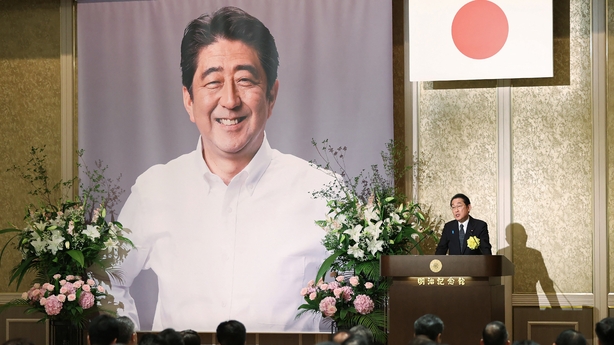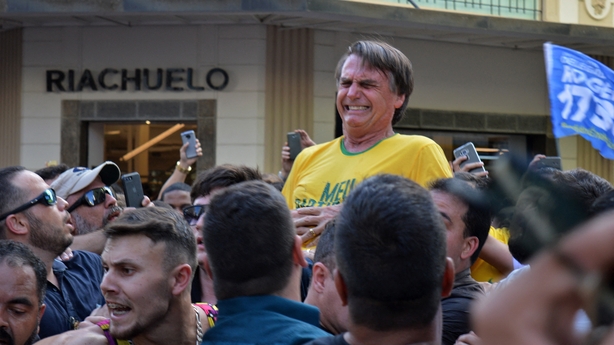All eyes will be on Donald Trump when he speaks at the Republican National Convention in Milwaukee on Thursday, and makes his first speech since Saturday's assassination attempt on his life.
Will Mr Trump come out fighting with a clenched fist, hammering liberal opponents for creating, as he once claimed, "American carnage"? Or, adopt a more conciliatory tone to appeal to voters in swing states? His past form as a political campaigner would suggest the former.
The 45th US president is the latest high-profile politician in recent years to be targeted by an attempted assassin.
In May this year, Slovakia's Prime Minister Robert Fico survived an assassination attempt, as did Brazil's former president, Jair Bolsonaro, in 2018, during his country's presidential election campaign that year.
Two recent assassination attempts have resulted in tragedy.
In August last year, Ecuadorian presidential candidate Fernando Villavicencio, a vocal anti-corruption campaigner and former journalist, was assassinated. Five gang members were convicted this week for his murder. His death summed up the main concern of voters in the presidential campaign: crime.
Former Japanese Prime Minister Shinzo Abe was assassinated in 2022, an event that shocked Japan, a country with one of the world's lowest murder rates.
Since his death, Mr Abe's Liberal Democratic Party, which has governed Japan almost continuously since the mid 1950s, remains the country's dominant political force.

for Shinzo Abe on the first anniversary of his assassination in July 2023.
Little, if anything, links US, Brazilian and Slovakian politics, apart from the fact that attempts have been made by lone attackers to assassinate populist leaders in each country.
Politics in all three countries is also deeply polarised, but that can be said of many European democracies at the moment.
Assassination attempts on political leaders in Europe and North America are rare. So, it was surprising for Slovaks, when, on 15 May, an elderly suspect attempted to kill their prime minister.
Mr Fico was shot four times by his attacker as he met members of the public in a town in central Slovakia. He underwent five hours of life-saving surgery and has spent the past two months recovering from his injuries.
Many Slovak political observers awaited the tone of Mr Fico's first speech since the attempted assassination. Would he reach over the political divide and work with the liberal opposition?
The answer has been a firm no. In a recorded video message in early June, his first since the attempted assassination, Mr Fico forgave his attacker, but gave no quarter to his political opponents.
He said an "activist of the Slovak opposition" had tried to assassinate him because of his political views, and that his attacker had been a "messenger of evil and hatred" developed by an "unsuccessful opposition" in Slovakia.
"It was a message for Fico's supporters," Géza Tokár, a Slovak-Hungarian political journalist told RTÉ News.
Slovak politics, he said, has not "changed positively and perhaps it might have even become worse" since the attack on Mr Fico.

On 4 July, Slovak police reclassified the shooting as a terrorist act though the attacker's motives still remain undisclosed.
The 71-year-old suspect had taken part in opposition rallies earlier this year, but local media had also found that he had links in the past with a fringe nationalist movement.
Last week, Mr Fico made his first public speech since the assassination attempt. His language, directed against liberal opponents, had hardened further still.
"We must all build a huge dam against the non-sensical, progressive and liberal ideologies that are spreading like a cancer," he said.
The attempt on Mr Fico's life placed Slovakia's pro-EU opposition parties in a difficult situation. The main opposition party, Progressive Slovakia, suspended campaigning for the European elections and, for weeks after the assassination attempt, avoided criticising the prime minister and his party.
However, it did not seem to damage the party as it topped the polls in the European election just ahead of Mr Fico's SMER party.
In Brazil, populist leader Jair Bolsonaro was stabbed three times in the stomach by an assailant as he campaigned during the country's presidential election in 2018.
Mr Bolsonaro lost 40% of his blood from the assassination attempt and almost died, only for surgeons to stabilise his condition. His attacker was acquitted a year later on the grounds that he was declared mentally ill.
Mr Bolsonaro, often compared to Mr Trump for his anti-liberal views, climate change scepticism and outrageous statements, went on to win the second round vote one month after the knife attack and serve as Brazil's president from 2019 to 2023.

a campaign rally in southern Brazil on 6 September 2018.
Polls at the time showed that Mr Bolsonaro's popularity increased slightly after the attack but there was no major swing or sympathy vote towards him, such was (and still is) the polarised nature of Brazilian politics.
Supporters of the left and other progressive candidates from the first round stuck with the left-wing candidate in the run-off, who Mr Bolsonaro defeated by 10 percentage points.
Like the more recent case of Mr Fico, Mr Bolsonaro's opponents in 2018 took a step back from criticising a politician who had survived a brutal attempt on his life.
The Democrats and US President Joe Biden face a similar dilemma. Attack Mr Trump's record too strongly in the coming weeks and they could look unsympathetic, and risk losing voters in key swing states.
In Brazil, Mr Bolsonaro is unlikely to run for president again. Last year, the country's highest court found him guilty of abuse of power for sowing doubts about the legitimacy of the voting system after he lost the presidential election in 2022. The decision bars him from politics until the end of this decade.
In January 2023, one week after the inauguration of current leftist president, Luiz Inacio Lula da Silva, thousands of Bolsonaro supporters stormed Brazil's Congress building in the capital, Brasilia.
The parallels with Mr Trump's supporters storming the US Capitol building on 6 January 2021 were palpable.







